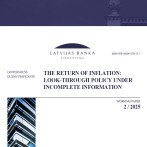Deflation: Its Causes and Effects
Entering a recession after overheating in previous years, it is very likely that the Latvian economy will face a moderate drop in prices, i.e. deflation, as early as this autumn. This process, however, is not going to be prolonged and, as the global economy recovers, a return to low inflation is likely.
Deflation is an across-the-board drop in consumer prices, a process opposite to inflation. A drop in prices in a particular month or a couple of months does not represent deflation. It is common for the general price levels to drop during the summer months as a result of an increased supply of food items or in January as the demand drops after the end-of-the-year shopping sprees. Deflation, on the other hand, becomes topical if the price decrease can be measured year-on-year and this situation persists for some time, at least one year.
Deflation is caused by decreased domestic demand, consumption that may have a variety of causes. In Latvia, two cause-and-effect series are of importance.
One is the decrease in foreign demand caused by the global crisis-drop in exports-decrease in business income followed by cutting of expenses and an impact on unemployment. The problems with exports are exacerbated by the structure of Latvian exports where low value-added goods predominate.
The other is the return of the economy to sustainable levels of income and prices following the overheating. The rapid growth of the previous years was supported by large inflows of funds, the real estate boom stimulated by lending, and the upsurge in income fostered by the budget and taxation policies inadequate for this branch and cycle of the economy. Over the course of a few years, the average salary doubled with productivity remaining almost unchanged, and inflation reached EU records. As the bubble bursts, income levels drop with demand and prices following suit. The government expenditures likewise reach income-matching levels, exacerbating the drop in domestic demand.
Under the circumstances of dropping economic growth rates and wage levels, deflation is somewhat of a relief for the consumer, since prices are decreasing. Businesses have both the need and opportunity to cut the wages unsupported by productivity and also the prices inflated by the high expenditures and high demand. During deflation, businesses will also augment productivity by supporting production or services with lesser expenditures, switching to other products or services, making deliveries more effective, etc. It means that the chances of survival and development will be greater for those businesses that have always had a long-term strategy.
Deflation can only become a serious problem for the economy if a so-called deflation spiral develops, supported by expectations of ever greater deceleration of the economy and price reductions. To wit, as price reductions take root in the expectations of the market participants, expenditures for consumption and investment are postponed: everyone postpones their purchases expecting a further decline in prices.
As a small and open economy, this risk is smaller for Latvia than for large economies based on domestic demand. The reason is our great dependence on imports, which makes us dependent on price levels and changes in partner countries. That means that prices in Latvia will be directly influenced by the EU countries returning to growth, which will be followed by a moderate rise in prices.
On the other hand, increased confidence in the Latvian economy would foster the investment climate, which will depend on the recovery of the foreign markets and the respective growth in Latvian exports as well as work performed by Latvia itself. In order to reduce the uncertainty regarding Latvia’s future prospects, an agreement with the IMF must be signed, and the government must have a clear and convincing position and action plan in straightening out the budget, which in turn will act to boost the prospects of a timely euro changeover.
\How about deflation experiences elsewhere? Well-known deflation periods over the last hundred years have been related to economic crises: the United States during the Great Depression of 1929-1933, Japan 1990-2006, and Hong Kong following the Asian financial crisis of 1998-2004 are all relevant examples.
The causes of the crisis in Hong Kong, which is not unlike Latvia in terms of the degree of the openness of its economy, are similar to those in Latvia; the course it took out of the crisis was also similar: by way of deflation increasing its international competitiveness while retaining its currency peg. The resumption of price rises in Hong Kong, like Latvia a small and open economy, could have been ensured by price rises in its trade partners. At the time, the dropping prices in Hong Kong’s most important partner China acted to prolong the deflation, yet overall Hong Kong weathered the crisis successfully and, in terms of the growth of its economy, left the other crisis-ridden Southeast Asian countries far behind.
Textual error
«… …»






